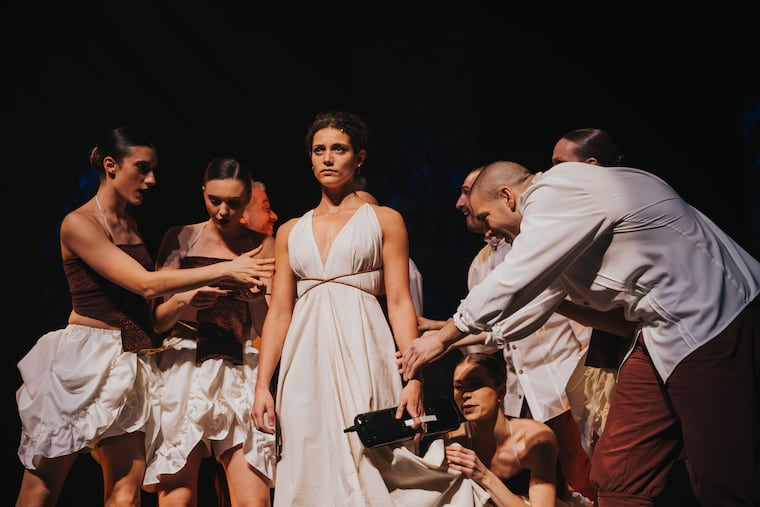Koresh Dance Company’s ‘Masquerade’ shines in the glorious talent of its guest artist, Sage DeAgro-Ruopp
The company's dancers demonstrated their usual technical brilliance and versatility in the production that teams contemporary dance with live opera.

These days it’s rare to find contemporary dance presented with live music, and contemporary dance with live opera is often unheard of — unless you’re Mark Morris.
Roni Koresh does exactly that, through his new work, Masquerade, which premiered Thursday at the Suzanne Roberts Theatre. It focuses much of our attention on the young American soprano Sage DeAgro-Ruopp. A singer of exceptional gifts, DeAgro-Ruopp is also a composer — responsible for all the music in Masquerade. At several points in the performance, she even plays the melodica, a small handheld keyboard instrument.
DeAgro-Ruopp has impeccable classical credentials (Oberlin Conservatory, Curtis Institute), but she also performs many other types of music and is a skilled actress with a healthy sense of humor. As a result, this guest artist seemed at home with the Koresh Dance Company, whose members demonstrated their usual technical brilliance and versatility, segueing from emotionally devastating passages to whimsical ones, and from balletic grace to angular, percussive steps — accented with folk dance elements.
Peter Jakubowski’s dramatic and inventive lighting design set appropriately varied moods for the 15 short segments of Masquerade, further enhanced by Karl Mullen’s stylized paintings hung at the rear of the stage. The production’s handsome costumes, which accentuated the dancers’ fluid movements, were designed by Koresh, with Alicia Tom.
For this project, DeAgro-Ruopp combined digital instrumental tracks with her own live singing of texts excerpted from sources as diverse as 19th-century German poetry, French symbolism, Italian opera, and a 1930′s Hollywood musical. This required her to sing in several different languages and styles, which is standard for classical artists.
In a recent telephone interview, DeAgro-Ruopp said that she chose not to include these lyrics or their translations in the printed program, in order to create a sense of mystery for the audience, and to force herself to find other vocal and physical ways to convey their meaning.
This parallels what Koresh said during the post-performance Q&A about the sometimes-obscure choreography in Masquerade. The piece, he said, was inspired by both physical masks that people wore at the height of the pandemic and the many ways in which we mask, or obscure, our true feelings in daily life. But he wanted the audience to interpret his work in their own ways.
For this viewer, a few elements in the first part of the program — such as DeAgro-Ruopp’s frequent entrances and exits and recordings of iconic lines from classic films (like Brokeback Mountain and Cool Hand Luke) — seemed superfluous and distracting. The works performed after intermission were more straightforward in their references to lost youth, lost love, and various types of metaphoric masking.
Overall, taking nothing away from the Koresh troupe’s outstanding work, several of the evening’s most moving points came when DeAgro-Ruopp simply walked downstage, stood there, and sang.
The evening began with an impeccable performance by the Koresh Youth Ensemble, of a piece choreographed for them by the company’s assistant artistic director and longtime lead dancer, Melissa Rector.
Koresh Dance Company’s “Masquerade.” Through May 7. Suzanne Roberts Theatre, 480 S. Broad St., Phila. $35-$45, 215-985-0420 or koreshdance.org